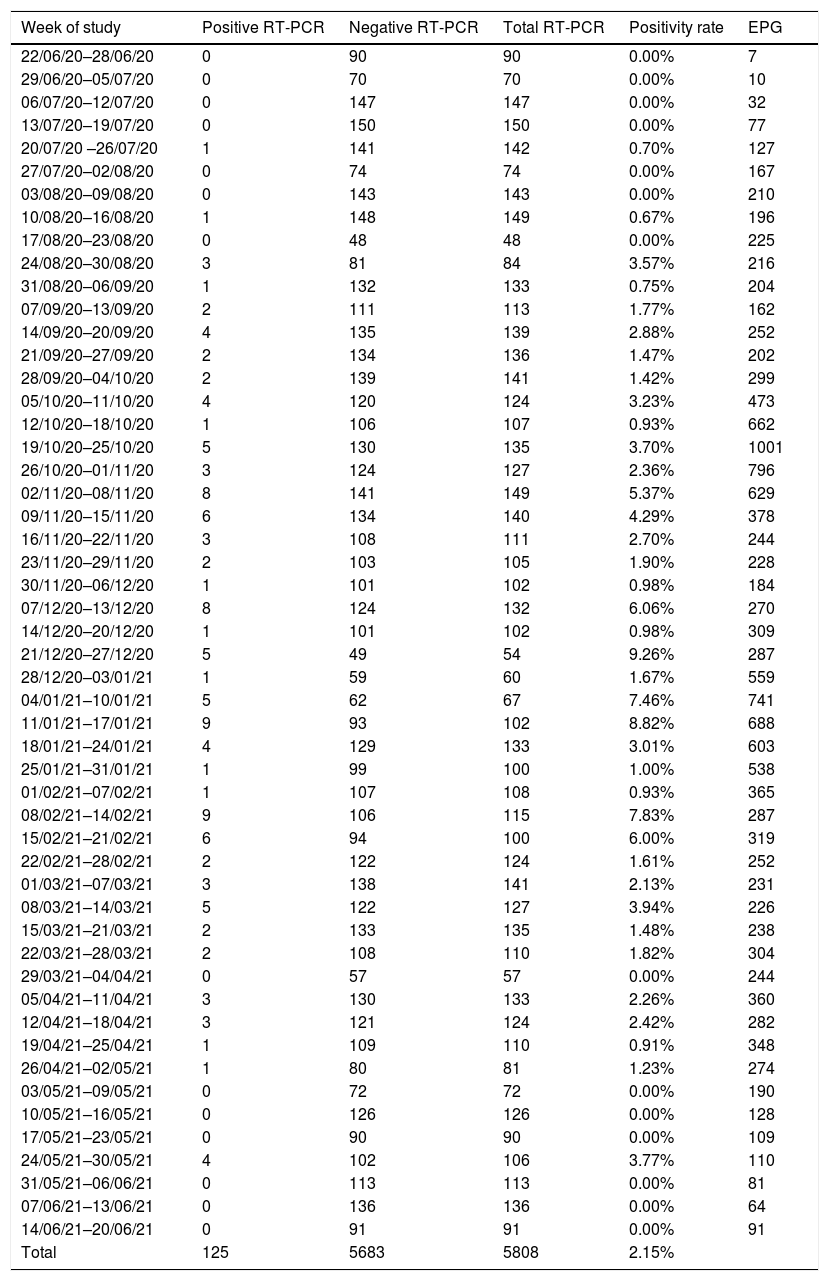Endoscopy units are considered to be at an increased risk of infection by SARS-CoV-2. Our aim is to assess the correlation between pre-endoscopic screening with reverse-transcription-polymerase-chain-reaction (RT-PCR) in asymptomatic individuals scheduled for elective endoscopy and the epidemiological data published by the local Health Administration.
Patients and methodsObservational retrospective study collecting the results of our screening strategy spanning June/2020–June/2021, the effective potential growth (EPG), an index measuring the outbreak risk, and the 7 and 14-day cumulative incidence (CI). Indication, delay and the findings of the endoscopic examinations were registered for RT-PCR positive patients.
ResultsA total of 5808 tests were performed, yielding 125 positive results (2.15%). All positive tests occurred in weeks of high/very high risk (EPG>100) with the highest monthly rate being 9.36%, recorded in January/2021. A significant correlation (rho=0.796; p<0.001) between weekly positive rates and EPG was observed, and a significantly lower weekly number of positive tests was recorded when EPG<100. Planning the screening strategy one week ahead according to EPG>100 would have avoided up to 826 tests with only one positive result to account for. One hundred and thirteen individuals tested positive and 89 endoscopies were delayed. The most common findings were colon polyps, colorectal cancer and gastric metaplasia. Oncological diagnosis was delayed 50±3 days.
ConclusionsNo positive RT-PCR test were registered out of high-risk periods. Epidemiological administrative data in the preceding two weeks showed a significant correlation with screening results and could be useful to plan pre-endoscopic screening and avoid unnecessary tests.
La actividad endoscópica comporta un riesgo elevado de transmisión de la infección por SARS-CoV-2. Nuestro objetivo es valorar la correlación entre el cribado pre-endoscópico con reverse-transcription-polymerase-chain-reaction (RT-PCR) en individuos asintomáticos programados para una endoscopia ambulatoria y los datos epidemiológicos publicados por el departamento de salud pública.
Pacientes y métodosEstudio observacional retrospectivo de los resultados del cribado realizado entre junio/2020 y junio/2021. Se registró el índice de crecimiento potencial (ICP) y la incidencia acumulada a 7 y 14 días. En los pacientes con RT-PCR positiva se registraron indicación, demora y hallazgos endoscópicos.
ResultadosSe identificaron un total de 5.808 test con 125 resultados positivos (2,15%). Todos los resultados positivos se registraron en semanas consideradas de alto/muy alto riesgo (ICP>100), con una tasa máxima de positivos del 9,26% en enero/2021. Se observó una correlación significativa (rho=0,796; p<0,001) entre la tasa de positivos y el ICP, así como una diferencia estadísticamente significativa con la tasa de positivos en las semanas con el ICP<100. Planificar el cribado acorde al ICP>100 en la semana previa, habría evitado hasta 876 test, con un único resultado positivo. Ciento trece pacientes resultaron positivos y se demoraron 89 endoscopias; los hallazgos más frecuentes fueron pólipos, cáncer colorrectal y metaplasia gástrica. El diagnóstico oncológico se demoró 50±3 días.
ConclusionesNo se registraron RT-PCR positivas fuera de los períodos de alto riesgo. Los datos epidemiológicos de las dos semanas anteriores mostraron una correlación significativa con los resultados del cribado y podrían ser útiles para planificar el mismo y evitar pruebas innecesarias.











